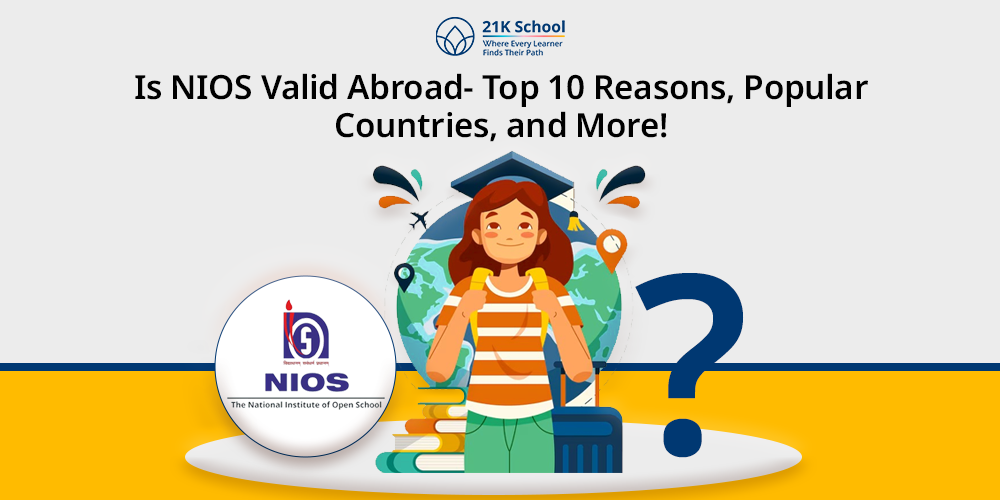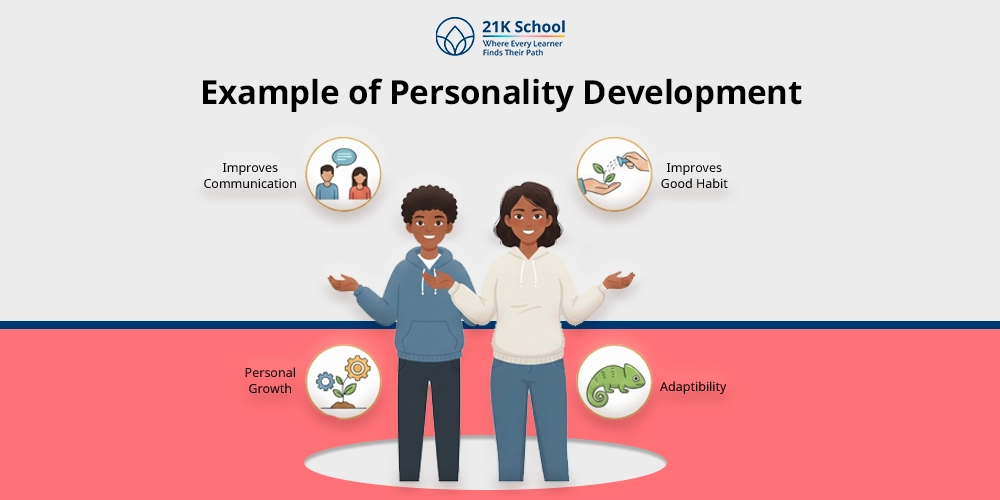
The National Institute of Open Schooling (NIOS) is an increasingly popular choice for students in India who want a flexible, recognised alternative to traditional schooling .
Whether due to personal circumstances, health issues, or a preference for independent learning , many students opt for NIOS to complete their secondary or senior secondary education .
But if you’re planning to pursue higher studies or job opportunities abroad, a critical question comes up: is NIOS valid for higher education abroad?
Let’s explore this in detail and understand how NIOS holds up on the global stage.
Contents
- 1 Is NIOS Valid Abroad?
- 1.1 1. Government Recognition
- 1.2 2. Equivalency to Other Boards
- 1.3 3. AIU Equivalency
- 1.4 4. International Recognition
- 1.5 5. Flexibility Meets Global Learning Standards
- 1.6 6. NIOS Curriculum Meets 10+2 Format
- 1.7 7. Accepted by Global Universities
- 1.8 8. Valid for International Entrance Exams
- 1.9 9. UGC & Higher Education Eligibility
- 1.10 10. Used Successfully in Visa & Immigration
- 2 NIOS and International Job Opportunities
- 3 Can NIOS Students Apply for Student Visas?
- 4 Popular Countries That Accept NIOS Certificates
- 5 Challenges NIOS Students Might Face Abroad
- 6 How to Increase Your Global Acceptance with NIOS
- 7 Conclusion: Is NIOS a Globally Valid Option?
Is NIOS Valid Abroad?
Yes, National Institute of Open Schooling (NIOS) is valid for further studies abroad. NIOS is recognised by the Government of India and considered equivalent to CBSE and other national boards.
Many universities in countries like the USA, UK, Canada, Australia, and the UAE accept NIOS certificates for admission. With proper documentation and test scores, NIOS students can also apply for student visas and international jobs.
Here are the 10 reasons why NIOS is valid for further studies abroad:
1. Government Recognition
NIOS is officially recognised by the Ministry of Education, Government of India. It operates as a national board, much like CBSE and ICSE, and offers valid certification for Class 10 and Class 12.
This recognition is crucial because foreign universities and visa authorities often consider whether a student’s home-country qualifications are backed by the government.
Since NIOS is a government-approved board, its certificates carry weight and legitimacy in both national and international settings.
2. Equivalency to Other Boards
NIOS follows the same 10+2 academic structure used by most Indian education boards. The content, duration, and academic standards are similar, making NIOS certificates educationally equivalent to those issued by CBSE, ISC, and state boards.
This equivalency allows students to apply to Indian and foreign universities without the need for additional schooling, as long as other eligibility requirements are met.
3. AIU Equivalency
The Association of Indian Universities (AIU) has confirmed that NIOS certifications are equivalent to those from other recognised boards. This equivalency is often required by international institutions to evaluate if a student’s academic background matches their entry criteria.
With AIU validation, NIOS students can confidently apply to universities abroad, as this endorsement makes their certificate acceptable in most global academic systems.
4. International Recognition
The acceptance of NIOS has grown over the years like IB or Cambridge. Universities in the USA, UK, Canada, Australia, Germany, and the Middle East have accepted NIOS-certified students into undergraduate and diploma programs.
What matters most to foreign institutions is not the popularity of your board but the authenticity, documentation, and alignment with their requirements, and NIOS checks those boxes when properly presented.
5. Flexibility Meets Global Learning Standards
The greatest strength of NIOS lies in its unmatched flexibility. It empowers students to learn at their own pace, chooses subjects that suit their interests, and schedule exams when they feel ready.
In today’s world, where global education trends prioritise self-directed learning , personalised pathways, and modular approaches, NIOS fits right in.
Its open schooling model mirrors international practices like homeschooling and independent study, making it not just a national alternative, but a globally relevant system that supports freedom in learning.
6. NIOS Curriculum Meets 10+2 Format
NIOS uses the 10+2 model, which is a globally accepted format for school education. Students complete 10 years of foundational education, followed by 2 years of senior secondary schooling.
This format is essential for foreign universities that require 12 years of schooling as a baseline for undergraduate admissions. NIOS fully meets this criterion.
7. Accepted by Global Universities
Many students with NIOS qualifications have been admitted into universities abroad. Countries that have accepted NIOS certificates include:
- United States: Community colleges and universities accept NIOS, especially with SAT/ACT scores.
- United Kingdom: Institutions consider NIOS certificates valid, particularly with strong IELTS scores.
- Canada: Colleges and universities accept NIOS transcripts as long as they’re verified.
- Australia & New Zealand: NIOS certificates are accepted with proof of English proficiency.
- UAE & Middle East: Widely recognised across international institutions.
Admissions depend on the overall profile, including language scores, transcripts, and academic performance, not the name of the board alone.
8. Valid for International Entrance Exams
NIOS students are fully eligible to appear for major international entrance tests, such as:
- SAT / ACT for the US
- IELTS / TOEFL for English proficiency
- UCAS applications for the UK
- PTE / GRE / GMAT for further studies
This eligibility confirms that NIOS is accepted as a valid educational background for students aiming for global opportunities.
Explore which Canadian universities accept NIOS .
9. UGC & Higher Education Eligibility
NIOS is recognised by the University Grants Commission (UGC) in India. This allows students to pursue higher education in Indian colleges and universities without any restriction.
Since foreign universities often ask whether your board is recognised by your home country’s higher education system, this UGC endorsement increases NIOS’s credibility abroad.
10. Used Successfully in Visa & Immigration
Students with NIOS certificates have successfully obtained student visas to study in countries like Canada, Australia, the UK, Germany, and the UAE. Visa officers look for consistency in documentation, recognised qualifications, and a genuine study plan.
As long as your NIOS mark sheets are attested, and you meet other visa requirements such as language scores and financial proof, your schooling background will not be a barrier.
NIOS and International Job Opportunities
For jobs abroad, employers usually focus more on higher education degrees and job-related skills than on your school background.
That said, NIOS certificates are acceptable for roles that require 10th or 12th qualifications, especially in countries where such documentation is required for background checks or work permits.
In regulated fields like medicine or law, further qualifications and licensing are mandatory, regardless of the board you studied under.
Also check out: Is NIOS Valid for Government Jobs ?
Can NIOS Students Apply for Student Visas?
Yes, NIOS students are eligible to apply for student visas. What matters most is:
- Admission to a recognised foreign institution
- A valid and attested NIOS certificate
- Proof of English proficiency (IELTS/TOEFL)
- Financial capability and clear intent
Popular Countries That Accept NIOS Certificates
Here are some countries where students have successfully used NIOS credentials:
- USA
- UK
- Canada
- Australia
- New Zealand
- Germany
- UAE
Challenges NIOS Students Might Face Abroad
Though NIOS is valid abroad for higher education, some challenges can arise:
- Lack of awareness: Some foreign institutions may not know much about NIOS and may ask for extra clarification.
- Document verification: Students might need to get their certificates notarised, translated, or authenticated.
- Competitive programs: Top-tier universities might prefer mainstream or international boards unless the overall profile is strong.
How to Increase Your Global Acceptance with NIOS
To strengthen your profile:
- Score well in NIOS exams
- Take IELTS, SAT, or other standardised tests
- Keep all documents well-organised and attested
- Write a strong Statement of Purpose (SOP)
- Highlight your independent learning experience
- Use official NIOS transcripts and AIU equivalency letters, if needed
Conclusion: Is NIOS a Globally Valid Option?
Yes, NIOS is valid abroad for higher education, competitive exams, student visas, and even job applications. It is recognised by the Indian government, follows the 10+2 format, and is accepted by many universities across the world.
With proper documentation, strong performance, and careful planning, NIOS can be a solid stepping stone for students aiming to study or work internationally.
Read next: Cheapest Universities in the World for International Students .



